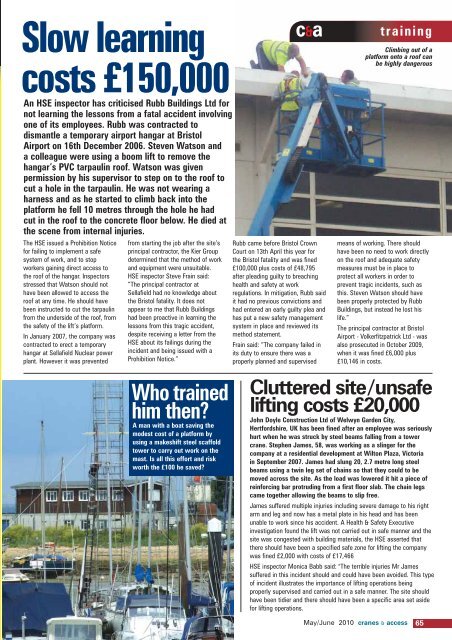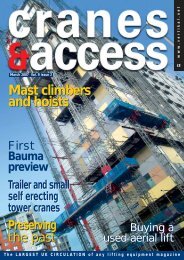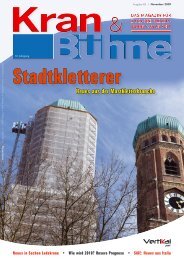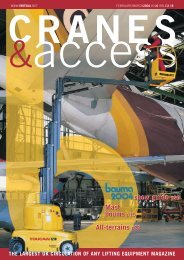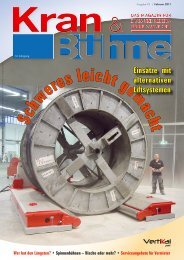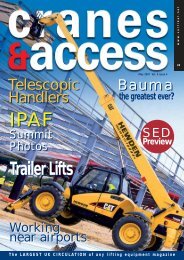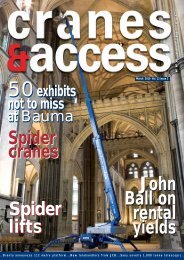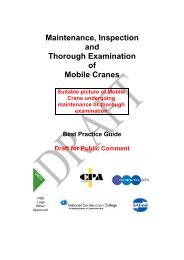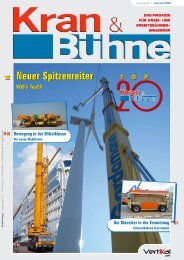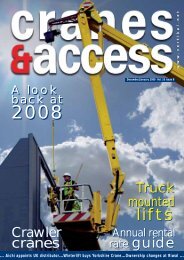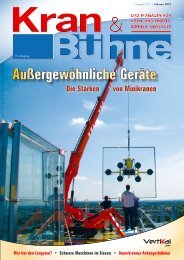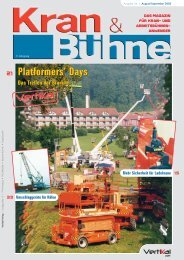Create successful ePaper yourself
Turn your PDF publications into a flip-book with our unique Google optimized e-Paper software.
Slow learning<br />
costs £150,000<br />
An HSE inspector has criticised Rubb Buildings Ltd for<br />
not learning the lessons from a fatal accident involving<br />
one of its employees. Rubb was contracted to<br />
dismantle a temporary airport hangar at Bristol<br />
Airport on 16th December 2006. Steven Watson and<br />
a colleague were using a boom lift to remove the<br />
hangar’s PVC tarpaulin roof. Watson was given<br />
permission by his supervisor to step on to the roof to<br />
cut a hole in the tarpaulin. He was not wearing a<br />
harness and as he started to climb back into the<br />
platform he fell 10 metres through the hole he had<br />
cut in the roof to the concrete floor below. He died at<br />
the scene from internal injuries.<br />
The HSE issued a Prohibition Notice<br />
for failing to implement a safe<br />
system of work, and to stop<br />
workers gaining direct access to<br />
the roof of the hangar. Inspectors<br />
stressed that Watson should not<br />
have been allowed to access the<br />
roof at any time. He should have<br />
been instructed to cut the tarpaulin<br />
from the underside of the roof, from<br />
the safety of the lift’s platform.<br />
In January 2007, the company was<br />
contracted to erect a temporary<br />
hangar at Sellafield Nuclear power<br />
plant. However it was prevented<br />
from starting the job after the site’s<br />
principal contractor, the Kier Group<br />
determined that the method of work<br />
and equipment were unsuitable.<br />
HSE inspector Steve Frain said:<br />
“The principal contractor at<br />
Sellafield had no knowledge about<br />
the Bristol fatality. It does not<br />
appear to me that Rubb Buildings<br />
had been proactive in learning the<br />
lessons from this tragic accident,<br />
despite receiving a letter from the<br />
HSE about its failings during the<br />
incident and being issued with a<br />
Prohibition Notice.”<br />
Who trained<br />
him then?<br />
A man with a boat saving the<br />
modest cost of a platform by<br />
using a makeshift steel scaffold<br />
tower to carry out work on the<br />
mast. Is all this effort and risk<br />
worth the £100 he saved?<br />
c&a<br />
Rubb came before Bristol Crown<br />
Court on 13th April this year for<br />
the Bristol fatality and was fined<br />
£100,000 plus costs of £48,795<br />
after pleading guilty to breaching<br />
health and safety at work<br />
regulations. In mitigation, Rubb said<br />
it had no previous convictions and<br />
had entered an early guilty plea and<br />
has put a new safety management<br />
system in place and reviewed its<br />
method statement.<br />
Frain said: “The company failed in<br />
its duty to ensure there was a<br />
properly planned and supervised<br />
training<br />
Climbing out of a<br />
platform onto a roof can<br />
be highly dangerous<br />
means of working. There should<br />
have been no need to work directly<br />
on the roof and adequate safety<br />
measures must be in place to<br />
protect all workers in order to<br />
prevent tragic incidents, such as<br />
this. Steven Watson should have<br />
been properly protected by Rubb<br />
Buildings, but instead he lost his<br />
life.”<br />
The principal contractor at Bristol<br />
Airport - Volkerfitzpatrick Ltd - was<br />
also prosecuted in October 2009,<br />
when it was fined £6,000 plus<br />
£10,146 in costs.<br />
Cluttered site/unsafe<br />
lifting costs £20,000<br />
John Doyle Construction Ltd of Welwyn Garden City,<br />
Hertfordshire, UK has been fined after an employee was seriously<br />
hurt when he was struck by steel beams falling from a tower<br />
crane. Stephen James, 58, was working as a slinger for the<br />
company at a residential development at Wilton Plaza, Victoria<br />
in September 2007. James had slung 20, 2.7 metre long steel<br />
beams using a twin leg set of chains so that they could to be<br />
moved across the site. As the load was lowered it hit a piece of<br />
reinforcing bar protruding from a first floor slab. The chain legs<br />
came together allowing the beams to slip free.<br />
James suffered multiple injuries including severe damage to his right<br />
arm and leg and now has a metal plate in his head and has been<br />
unable to work since his accident. A Health & Safety Executive<br />
investigation found the lift was not carried out in safe manner and the<br />
site was congested with building materials, the HSE asserted that<br />
there should have been a specified safe zone for lifting the company<br />
was fined £2,000 with costs of £17,466<br />
HSE inspector Monica Babb said: "The terrible injuries Mr James<br />
suffered in this incident should and could have been avoided. This type<br />
of incident illustrates the importance of lifting operations being<br />
properly supervised and carried out in a safe manner. The site should<br />
Ward<br />
Bushnell have been tidier and there should have been a specific area set aside<br />
for lifting operations.<br />
May/June 2010 cranes & access 65


